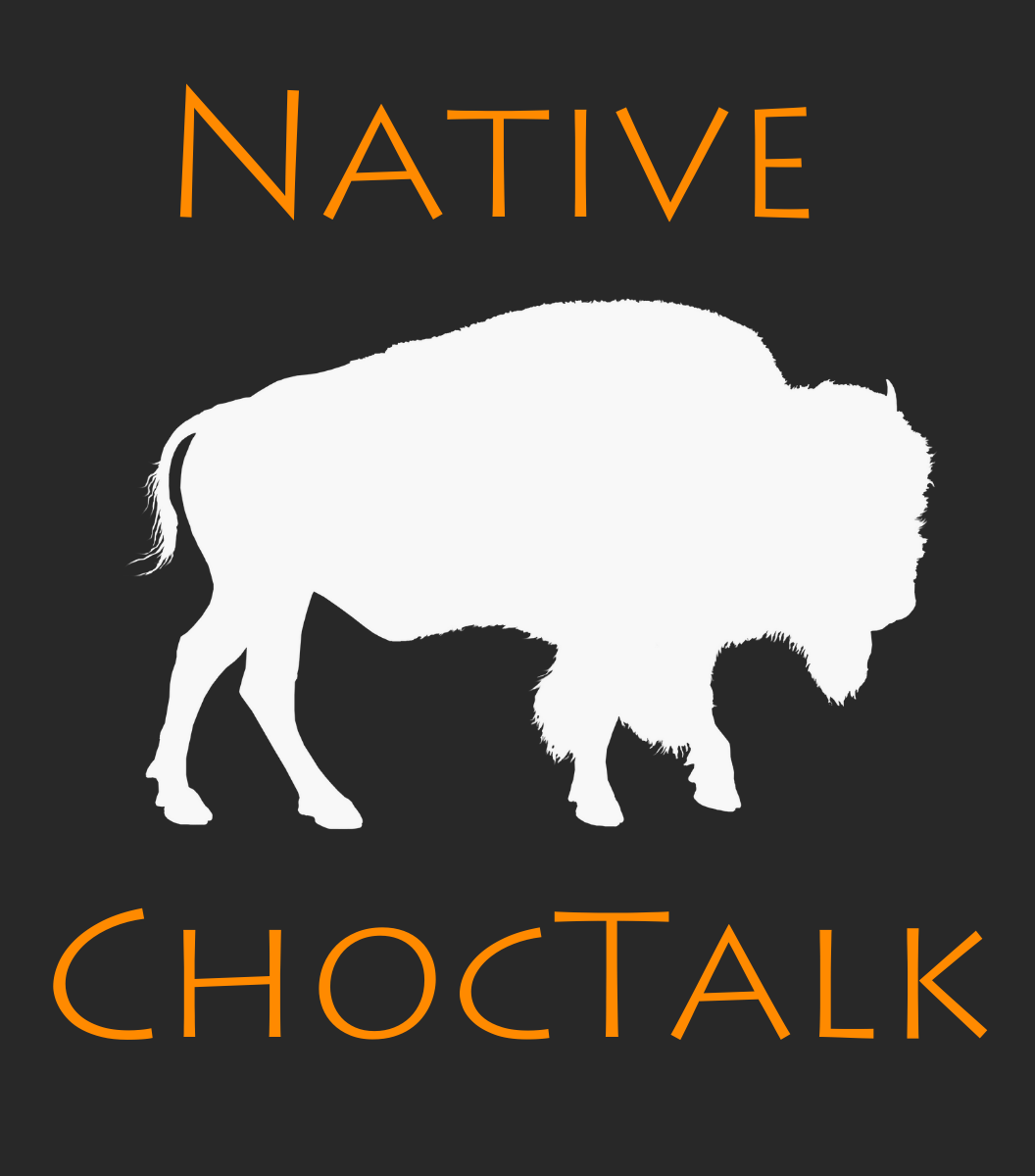Episodes
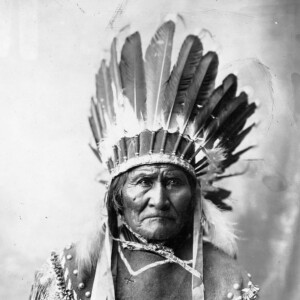
Sunday Nov 20, 2022
Sunday Nov 20, 2022
Part 2 of 3
"I should never have surrendered. I should have fought until I was the last man alive." These are the words spoken on the deathbed of probably the most well-know Native American warrior in history, known as Geronimo.
Some considered him a warrior, and many viewed him as a “sell-out, while others thought of him as a popular Native “character”, representative of all Indians in North America.
I must admit, until I met Author (and retired PhD Physicist), W. Michael Farmer, I underestimated the significant warrior skills of Geronimo. Now I have an entirely new respect for this Apache fighter.
In this episode of Native ChocTalk, you’ll learn about:
- The Chiricahua Apache
- Geronimo’s incredibly monumental warrior skills
- The lesser-known story of the little girl, Trinidad and her encounter with Geronimo
- Geronimo’s friendship with Quanah Parker
- The warrior’s quest to be set free to go “home”
- Skull & Bones Society, and the true-or-false controversy over Geronimo’s remains
Check out W. Michael Farmer’s website where you can find the 3 books we cover in this episode: https://wmichaelfarmer.com/
- “The Odyssey of Geronimo, Twenty Three Years a Prisoner of War”
- “Trini! Come!: Geronimo’s Captivity of Trinidad Verdin”
- “The Iliad of Geronimo”
Yakoke, Michael for sharing your research and expertise!
Native ChocTalk Facebook page: https://www.facebook.com/nativechoctalkpodcast
All Podcast Episodes: https://nativechoctalk.com/podcasts/
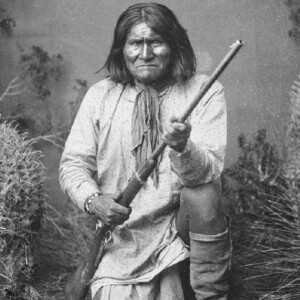
Tuesday Nov 15, 2022
Tuesday Nov 15, 2022
Part 1 of 3
"I should never have surrendered. I should have fought until I was the last man alive." These are the words spoken on the deathbed of probably the most well-know Native American warrior in history, known as Geronimo.
Some considered him a warrior, and many viewed him as a “sell-out, while others thought of him as a popular Native “character”, representative of all Indians in North America.
I must admit, until I met Author (and retired PhD Physicist), W. Michael Farmer, I underestimated the significant warrior skills of Geronimo. Now I have an entirely new respect for this Apache fighter.
In this episode of Native ChocTalk, you’ll learn about:
- The Chiricahua Apache
- Geronimo’s incredibly monumental warrior skills
- The lesser-known story of the little girl, Trinidad and her encounter with Geronimo
- Geronimo’s friendship with Quanah Parker
- The warrior’s quest to be set free to go “home”
- Skull & Bones Society, and the true-or-false controversy over Geronimo’s remains
Check out W. Michael Farmer’s website where you can find the 3 books we cover in this episode: https://wmichaelfarmer.com/
- “The Odyssey of Geronimo, Twenty Three Years a Prisoner of War”
- “Trini! Come!: Geronimo’s Captivity of Trinidad Verdin”
- “The Iliad of Geronimo”
Yakoke, Michael for sharing your research and expertise!
Native ChocTalk Facebook page: https://www.facebook.com/nativechoctalkpodcast
All Podcast Episodes: https://nativechoctalk.com/podcasts/
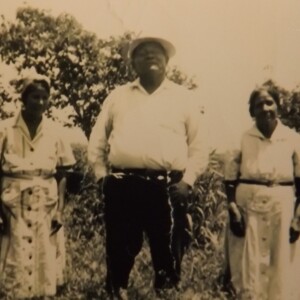
Thursday Oct 27, 2022
Thursday Oct 27, 2022
It was early morning as the Choctaw Mississippi families eagerly approached the train. A mother reached for her 3-year-old daughter’s hand to help lift her into the box train, her pudgy toddler fingers grasping tightly as she boarded the steel box on wheels for the very first time.
The little girl looked up at her ishki (her mamma), as she asked in her Choctaw tongue, “Are we leaving home?” Her mother answered, “Yes, we’re leaving to start a new home. And everything will be wonderful.”
But the future was not as hopeful as her mother had thought. This new start would be more like something from a nightmare. It’s a story that most have never heard – a second departure of the Choctaw in 1903 from their homelands in Mississippi to Indian Territory, now Oklahoma.
Join me and my guest, Deanna Byrd, a registered professional archaeologist and NAGPRA* Liaison-Coordinator for our Tribe, The Choctaw Nation of Oklahoma, as she discusses her groundbreaking research on this topic.
And please take a few minutes to watch this must-see documentary and beautiful tribute to these Mississippi Choctaw, and interviews with their descendants. (By Deanna Byrd and award-winning filmmaker and Native ChocTalk guest, Mark Williams): Ikhaiyana la chi – “I Will Remember” (https://www.youtube.com/watch?v=EzgTTJKN2mk)
“If there are professionals in institutions, universities, and/or museums that are unsure if they have a NAGPRA collection, if they have one and they don't know where to start, or just want to connect with other compassionate, open-minded individuals that are shaping the museum industry, please find us.”
– Deanna Byrd, NAGPRA Community of Practice: https://liberalarts.du.edu/anthropology-museum/nagpra/community-practice
Yakoke, Deanna for your tireless hours of work researching and giving these Choctaw Mississippi and their untold story a voice. May we never forget.
* NAGPRA: Native American Graves Protection and Repatriation Act
Native ChocTalk Facebook page: https://www.facebook.com/nativechoctalkpodcast
All Podcast Episodes: https://nativechoctalk.com/podcasts/

Tuesday Oct 25, 2022
Tuesday Oct 25, 2022
Become the CEO of “You, Inc.”. Know your strengths and weaknesses. Know that you’re here for a reason and a purpose.
These were the words of successful businessowner and CEO of Native Advisory, Lacey Horn when I asked what advice she had for other Native women (and people in general).
In this no-holes-barred conversation, Lacey and I discuss:
- How even CEOs make mistakes
- The pitfalls, lessons-learned, and challenges of running a successful business
- How her mom’s work in healthcare for the Cherokee people inspired her to help others
- That having a mentor is crucial
- How choices she made based on her family, body and mind have led to greater fulfillment
- The stories of her Cherokee ancestors
Native Advisory is a strategic advisory firm working with tribes all over the state of Oklahoma. Lacey’s job is to ensure that tribes maintain and attain true tribal sovereignty.
Between being a business owner at Native Advisory, Chairwoman of Native American Rights Fund, and a board member of the Smithsonian National Museum of the American Indian (and more), I asked Lacey, “How DO you do it all?”. You don’t want to miss her answer and the inspiration she shares for every Native (and non-Natives too)!
Wado, Lacey!
Lacey’s Company, Native Advisory: https://nativeadvisory.com/contact
Native ChocTalk Facebook page: https://www.facebook.com/nativechoctalkpodcast
All Podcast Episodes: https://nativechoctalk.com/podcasts/
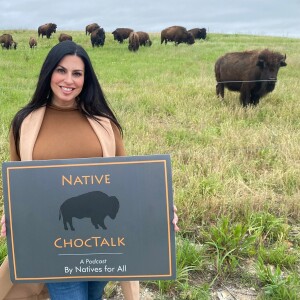
Thursday Oct 20, 2022
Thursday Oct 20, 2022
For centuries, he provided nourishment for hundreds of families. And for countless winters, his wooly coat sheltered them from the freezing, bitter winds.
He’s the American Bison. And as this beautiful creature was nearly erased from the earth, he still survived and carried on in all his majesty, just as our Choctaw people also live on.
My guests, Amy and Ian Thompson of Nan Awaya Homestead are some of the caretakers of our great and mighty bison, and of our Oklahoma lands and traditional Choctaw foods.
I know you will absolutely enjoy this episode where we learn about the history of the buffalo and our Native heritage surrounding these stunning creatures, as well as:
- The story of the buffalo vs the train
- The near extinction of our great bison
- Buffalo parenting
- How much buffalo weigh, how fast they can run and how high they can jump
- On a scale of 1-10, how ignorant people are who try to pet these beasts
- Revitalizing healthy Choctaw traditional cuisine
- Restoring the native landscapes of our pastures
As you may know, I’ve always been a huge an of the American Bison. In fact, my logo is a buffalo (his name is Yvnvsh – meaning “buffalo” in Choctaw). So for many reasons, this episode is near and dear to my heart.
Join us as we pay tribute to the mighty yvnvsh!
Nan Awaya Website: https://www.nanawaya.com/
Native ChocTalk Facebook page: https://www.facebook.com/nativechoctalkpodcast
All Podcast Episodes: https://nativechoctalk.com/podcasts/
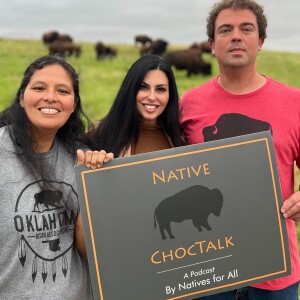
Thursday Oct 20, 2022
Thursday Oct 20, 2022
For centuries, he provided nourishment for hundreds of families. And for countless winters, his wooly coat sheltered them from the freezing, bitter winds.
He’s the American Bison. And as this beautiful creature was nearly erased from the earth, he still survived and carried on in all his majesty, just as our Choctaw people also live on.
My guests, Amy and Ian Thompson of Nan Awaya Homestead are some of the caretakers of our great and mighty bison, and of our Oklahoma lands and traditional Choctaw foods.
I know you will absolutely enjoy this episode where we learn about the history of the buffalo and our Native heritage surrounding these stunning creatures, as well as:
- The story of the buffalo vs the train
- The near extinction of our great bison
- Buffalo parenting
- How much buffalo weigh, how fast they can run and how high they can jump
- On a scale of 1-10, how ignorant people are who try to pet these beasts
- Revitalizing healthy Choctaw traditional cuisine
- Restoring the native landscapes of our pastures
As you may know, I’ve always been a huge an of the American Bison. In fact, my logo is a buffalo (his name is Yvnvsh – meaning “buffalo” in Choctaw). So for many reasons, this episode is near and dear to my heart.
Join us as we pay tribute to the mighty yvnvsh!
Nan Awaya Website: https://www.nanawaya.com/
Native ChocTalk Facebook page: https://www.facebook.com/nativechoctalkpodcast
All Podcast Episodes: https://nativechoctalk.com/podcasts/
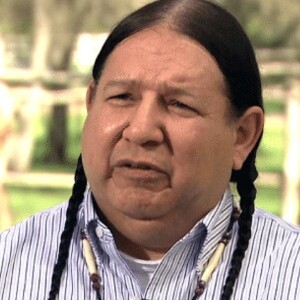
Friday Oct 14, 2022
Friday Oct 14, 2022
I recently caught up with Dr. Art Martinez from the Chumesh Tribe while he was at the Washoe Tribal Concessions at the beautiful Meeks Bay at Lake Tahoe. Dr. Martinez is a Trauma Specialist, and Clinical Psychologist. He’s also the Co-Director for the Center for Native Child and Family Resilience and more.
(If you or someone you know is struggling with domestic violence, thoughts of suicide or trauma, please see important resources below.)
Dr. Martinez has spent his career promoting the healing of historical trauma within our American Indian communities. In this episode, he shares examples of historical trauma as it pertains to those who were forced to flee their lands to save their people, the boarding schools and ongoing family trauma, the missing and murdered and their families, and drugs, alcohol, domestic violence and violence on the reservations and elsewhere.
Dr. Martinez is proud to work with Native Dads Network (“NDN”) to help build a stronger community for Native children who don’t have father figures. He also is involved in “Boys with Braids” to promote healing and strength, as well as several other valuable organizations.
In this episode you’ll also learn about:
- What trauma actually entails
- Why some American Indians don’t support each other
- What to do when you observe someone being abused
- White Bison, Inc., Native Wellness Institute, My Two Aunties - all agencies that are part of the solution for healing
- A form of historical trauma that Dr. Martinez himself has faced
- Suicide rates among American Indians
The following resources are available for those struggling with thoughts of suicide, domestic abuse, sexual violence and more:
- Center for Native Child and Family Resilience: https://cncfr.jbsinternational.com/
- Capacity Building Center for Tribes https://capacity.childwelfare.gov/tribes
- “StrongHearts Native Helpline is a 24/7 domestic, dating and sexual violence helpline for Native Americans and Alaska Natives, available by calling or texting 1-844-762-8483 or clicking on the chat icon on Strongheartshelpline.org.”
- National Suicide Prevention Hotline: 1-800-273-8255
- Crisis Text Line (Text to this number: 741741)
For those dealing with trauma or various forms of abuse, please know you are not alone and may Creator protect you and bless you.
Yakoke, Dr. Martinez for helping us to understand this crucial topic and for all you do to help our communities!
Communities for Healing:
- Native Dads Network: https://www.facebook.com/NativeDadsNetwork
- Boys with Braids: https://www.facebook.com/profile.php?id=100063728225133
- StrongHearts Native Helpline: https://www.facebook.com/strongheartsdv
- White Bison, Inc: https://www.facebook.com/whitebisoninc
- Native Wellness Institute: https://www.facebook.com/NativeWellnessInstitute
Native ChocTalk Facebook page: https://www.facebook.com/nativechoctalkpodcast
All Podcast Episodes: https://nativechoctalk.com/podcasts/
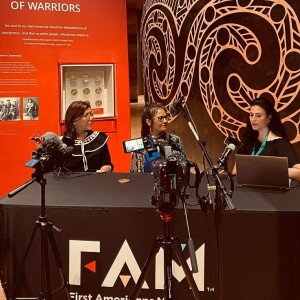
Thursday Oct 06, 2022
Thursday Oct 06, 2022
Native ChocTalk Presents Season 3, Episode 3: "Heroes of WWI: Nuchi Nashoba (Choctaw) and Judy Allen (Choctaw) on Our Choctaw Code Talkers"
They were forbidden to practice their culture and to speak in their Native tongue. And yet, in World War I, that very language would surprise the Germans and ultimately contribute to victory!
Many know of the Navajo Code Talkers, but what most don’t realize is that in World War I, it was the Choctaw who were the first to begin Code Talking.
I come to you today from the beautiful First Americans Museum (FAM) in Oklahoma City to talk about our Code Talkers with my Choctaw guests, Nuchi Nashoba (President of the Choctaw Code Talkers Association) and Judy Allen (Historic Projects Officer at Choctaw Nation of Oklahoma)!
I think you’ll enjoy this fascinating information on our great Choctaw Code Talker heroes. Yakoke, Nuchi and Judy!
Thanks again to First Americans Museum for hosting us! https://famok.org/
Native ChocTalk Facebook page: https://www.facebook.com/nativechoctalkpodcast
All Podcast Episodes: https://nativechoctalk.com/podcasts/

Monday Oct 03, 2022
Monday Oct 03, 2022
Native ChocTalk Presents:
S3, E2: Say Her Name: Karissa Hodge (Choctaw & Caddo) on Our Missing Murdered Indigenous Women–Chahta
A word of warning about today’s content – I’ll be speaking with Karissa Hodge, President and Founder of Missing Murdered Indigenous Women-Chahta. Although you’ll hear stories that are disturbing, they’re necessary to be told, in hopes that the missing may be found, and so the missing and murdered are never forgotten.
If you or someone you know is in a dangerous situation, please call the domestic violence hotline, at 1-800-799-7233 or visit thehotline.org.
You’ll also hear about Karissa’s own journey, as she has utilized her story as motivation to help others. I don’t take lightly the fact that Karissa is willing to share. Those who bravely come forward can sometimes face criticism from their family, friends and even their tribe. Yakoke, Karissa. We support you and your determination to help others!
MMIW-Chahta Facebook Page: https://www.facebook.com/NotInvisibleMMIWChahta
Native ChocTalk Facebook page: https://www.facebook.com/nativechoctalkpodcast
All Podcast Episodes: https://nativechoctalk.com/podcasts/
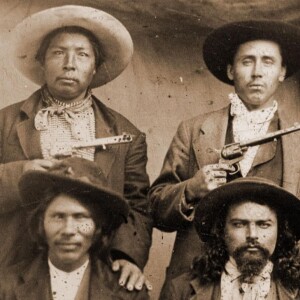
Thursday Sep 01, 2022
Thursday Sep 01, 2022
It was the 1800s and the days of the old wild west. As more settlers inhabited our Choctaw peoples’ lands in Mississippi and later Indian Territory, laws had to be put in place to attempt to tame the incoming unknowns. But who would enforce these rules on Native lands?
Every story needs a hero, and in today’s episode, you’ll hear about our brave Choctaw heroes who rode through the pine wood forests of Mississippi, and later the rolling mountains of southeastern Indian Territory, protecting and serving their Choctaw communities. They were the Issuba Ominili Tvshka – the Choctaw Lighthorsemen - and they WERE the law of our Indian lands during those wild west years.
Many thanks to my award-winning guests, Historians Ryan Spring from Choctaw Nation of Oklahoma and Tribal Policeman, Nick Wallace who delve into the worlds and history of these warriors on horses!
You’ll also get to hear excerpts from Sarah Elisabeth Sawyer’s book, “Traitors” from her Choctaw Tribune Series, Book 2 – thank you, Sarah.
Join us, as we honor and learn about these courageous Lighthorsemen and about some fascinating stories of the old wild west!
Native ChocTalk Facebook page: https://www.facebook.com/nativechoctalkpodcast
All Podcast Episodes: https://nativechoctalk.com/podcasts/

